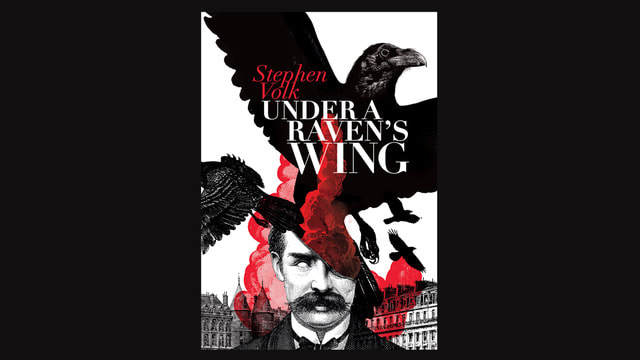STEPHEN VOLK
Under a Raven's Wing27/2/2021 My new book, Under a Raven's Wing, a paen to Edgar Allan Poe and Arthur Conan Doyle, is in many ways a tentative follow-up to The Dark Masters Trilogy, and in some ways harkens back even further, to my first work to hit the cinema screens, Gothic: a telling of the origin of Frankenstein through the eyes of Mary Shelley. I have grown to like using genre authors as a prism through whch to examine and explore my own infatiation and obsession with creating dark fiction. But the aim of this was a little more specific, as I elaborated to PS Publishing head honcho Peter Crowther when he asked me write a short blog to give insight into what spark ignited the project in my mind. I said this:
I’ve been a fan of Sherlock Holmes, like, forever. I know everyone says that, but really. Hand on heart, the first thing that genuinely scared me as a young kid was a radio production of The Hound of the Baskervilles. I couldn’t get off to sleep that night without my uncle explaining to me that the bone-chilling howl that echoed across Dartmoor was probably a bald man in glasses in a soundproof booth at the BBC. (I’m still only semi-convinced.) Still, the imagery, the chase, the detective, the clash between the rational and supernatural, all got in my blood and I’d never be the same again. I grew up. (Well, slightly. Let’s not be rash.) My reading choices changed, and I gravitated from Marvel’s Fantastic Four and Famous Monsters of Filmland to the numerous Pan books of horror stories, which almost invariably included the obligatory tale by Edgar Allan Poe. Back then, I never had an inkling of the tragic narrative of the author’s life (or even that he was American), but his incredible stories—“The Pit and the Pendulum”, “The Tell Tale Heart”, “The Black Cat”—reeked of deep, tangible psychological terror, unequalled even now for sheer symbolic bravura. I don’t know when it first occurred to me there was an inescapable connection between the two: between Poe and Doyle. It must have been on my first reading of “The Murders in the Rue Morgue”—featuring, as it did, a brilliant Paris detective and his not-so brilliant assistant and amanuensis. The case, one of brutal and bloodthirsty slaughter seemed completely unsolvable. However, under the might of Poe’s quill, C. Auguste Dupin did solve it—by a process of deduction he called ratiocination . . . Elementary, my dear Watson. And there it was. Hidden in plain sight, just like “The Purloined Letter”—another of Poe’s tasty conundrums. Dupin was no less than the exact progenitor of Sherlock, both in style and substance. And you don’t have to take my word for that. Doyle himself acknowledges it on numerous occasions. “Poe,” Sir Arthur said in his preface to The Adventures of Sherlock Holmes (1902), “in his carelessly prodigal fashion, threw out the seeds from which so many of our present forms of literature have sprung, was the father of the detective tale, and covered its limits so completely that I fail to see how his followers can find any fresh ground which they can confidently call their own.” Countless scholars and writers since have agreed that Holmes owes his creation in no small measure to the “first detective” in fiction—Dupin. Fast forward to 2010. Editors Charles Prepolec and Jeff Campbell ask me for a story to appear in their anthology Gaslight Arcanum: Uncanny Tales of Sherlock Holmes, the brief all to evident in the title, and I decide to submit something that dramatises Doyle’s indebtedness to Poe in story form. The result was “The Comfort of the Seine”, which drew the curtain back from my C. Auguste Dupin and a callow young Englishman called Sherlock visiting 1870s Paris for the first time. Little did I know, however, that this wasn’t the one-off story I thought it was, but rather the first of several featuring the duo of investigators I soon grew to love. I increasingly wanted to return to that sandbox to play and have more adventures, involving the most outrageous and shocking crimes that could be imagined. (By me, anyway.) Strangely, I am not constitutionally attracted to writing police procedurals. In a modern setting, their familiarity and ubiquitousness bore me. But in a Paris somewhere between the Franco-Prussian War and La Belle Époque, I found I could create a seethingly post-gothic world of crime and decadence that felt right in my wheel house. Freed of the canon of Doyle, set as it is in Victorian/Edwardian London, I could paint my world unreservedly in vivid colours taken from Poe, populating my stories with baroque ideas, grotesque scenes, and concepts that nudge to the very edge of the inexplicable—even supernatural. It was, I confess, as the stories added up year on year (and I wrote them really with no grand plan other than to please myself), a heady mixture and an intoxicating one. One that demanded I create impossible crimes—horrifying crimes—which would test the very limit of my detectives’ talent and resolve. It was also a labour of love to not only the various actors I had enjoyed playing Holmes over the years—Cushing, Rathbone, Brett . . .—but also to the immense influence of the Poe films of Roger Corman had exerted over me, and still did. But then something peculiar happened. I realised that the solving of crimes was not what I was writing. The series wanted to be more, finally. It had to be about the passing of the baton. From master to pupil. From C. Auguste Dupin to Sherlock Holmes, before the young detective was to meet his Watson in London, and the rest is history. That imperative took me on a journey to dig deeper into the two characters and what they meant to each other, and to me. For that reason I feel intensely proud of this book. I hope it will find a readership as excited by turning the pages as I was when writing them. And, coming it does on the heels of my Dark Masters Trilogy, I hope they feel it is a fitting tribute to two magisterial authors who, probably more than any others, shaped my writing taste and abiding obsessions to this day. Arthur Conan Doyle and Edgar Allan Poe. I salute you. And I hope Under a Raven’s Wing does, too. To order Under a Raven's Wing go to www.pspublishing.co.uk
0 Comments
Trauma, Secrets and Peter Cushing2/2/2021 Another chance to listen to this interview from 2018 in the series Write Through the Roof, the podcast by Madeleine d'Este for writers who want to improve their craft.
In Episode 25, amongst he subjects we discuss are:
Stephen VolkScreenwriter and author Archives
December 2023
|


 RSS Feed
RSS Feed
